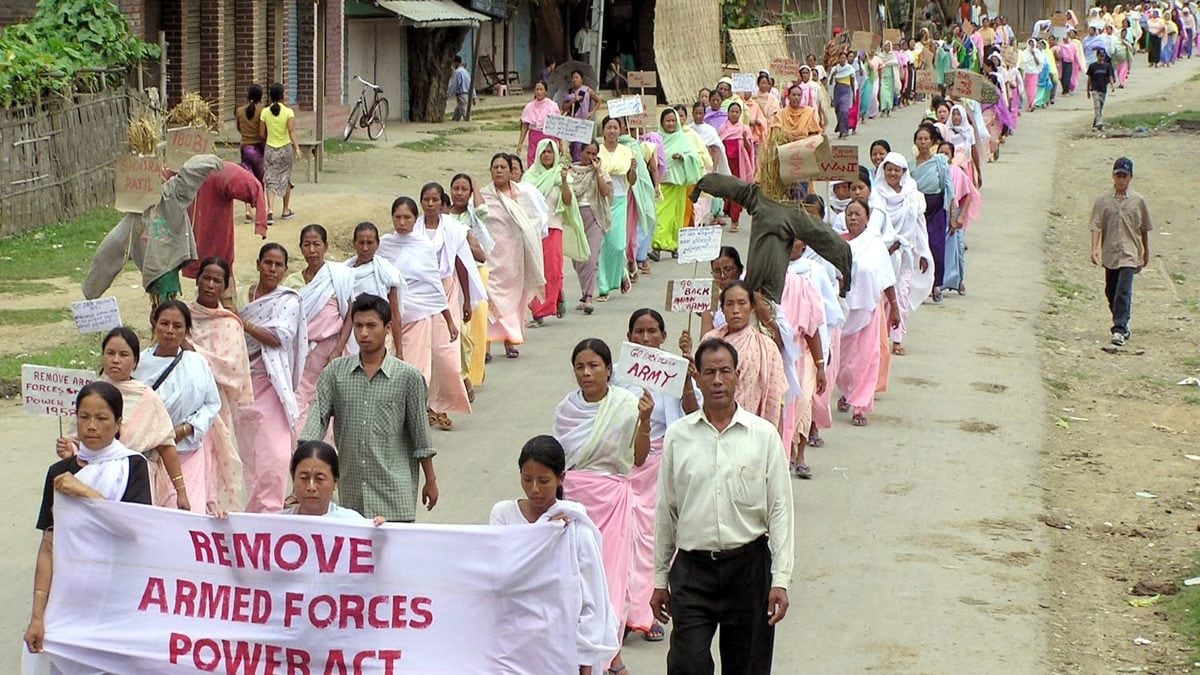AFSPA: Manipur Seeks Extension; Assam Okays Complete Removal

The discussion around the controversial Armed Forces Special Powers Act or AFSPA is once again at the fore after the Assam Cabinet decided to urge the government for the complete withdrawal of the Armed Forces Special Powers Act from Assam.
The districts where the AFSPA are still in effect in Assam include Dibrugarh, Tinsukia, Charaideo, Sivasagar, Golaghat, Jorhat, Karbi Anglong, and Dima Hasao. These districts still are tagged as “disturbed areas” within the state.
Assam Chief Minister Himanta Biswa Sharma recently met Union Home Minister Amit Shah in Delhi and announced last week that the state government is ready to make an appeal to the centre about the withdrawal of the act.
He further said that if the central government approves, a complete withdrawal of the act is expected by October this year.
Ever since Sarma’s announcement about the removal of AFSPA in the state, support started pouring in favour of the decision.
While speaking to News18, GM Srivastava, former DGP of Assam and Tripura who was at the helm of counter-insurgency operations in North East expressed his views,
“Initially I supported my year-long experience. I used to support AFSPA. I supported it when it was needed. Now Assam is ready to do away with it. The intensity of militancy in Assam and nearby states has come down to 5 per cent of what it used to be once upon a time. What is seen today is more criminals fighting for rights and they have to be handled like criminals and, because of that, Assam police are very well equipped,” Srivastava said.
“Over a period of time, the brigade is trained and the brigade has enough experience to handle things with paramilitary forces and also on its own. We used to have a special group with some 400 trained boys. They took on ULFA and brought it down to almost 20%,” he added.
Assam, once termed as the epicentre of extremism and insurgency in North-Eastern India, has gradually seen terror declining and thus the state government is preparing a roadmap to withdrawal of the controversial act.
“Assam police of late has trained 4 battalions alongside the Army and that I think is a very good initiative. The area of activity has also become limited as you know only two districts in upper Assam, Tinsukia, Dibrugarh, and part of Sivasagar. We can handle those areas too by different methods, by creating jobs, infrastructure, etc.,” the former DGP added.
The demand to repeal the act was reiterated once again after a Guwahati High Court verdict on March 9 this year.
In its order, the HC, after 29 years, ordered the Centre to pay Rs 20 lakh each as compensation within two months to the next of kin of five youths who had been killed by the Army at Dangari in the Tinsukia district in 1994.
The five deceased were Prabin Sonowal, Akhil Sonowal, Debijit Biswas, Bhaben Moran, and Pradip Dutta. The army picked up nine youths between February 17 and 19, 1994, after the assassination of the general manager of a tea garden in the Talap area of the Tinsukia district.
Later, Assam Students Union launched a massive statewide protest seeking justice for the 5 deceased.
The High Court issued its order after a habeas corpus petition was filed by Aasu leader Jagadish Bhuyan and Dipak Dutta, a relative of one of the deceased.
Human rights activists in the East have been continuously fighting against the injustice caused by the misuse of the act.
“AFSPA gives the power to search, seize, or shoot anybody without conviction. The army is trained to fight foreign powers on their borders and deploying them in civil society is a matter of objection worldwide. The UN has also recommended repealing this act. This should have actually gone long ago.” Assam human rights activist Lachit Bardoloi told News18.
Over the decades, the voice to retract the draconian AFSPA law has become only stronger. The Act gives power to the Armed Forces and the Central Armed Police Forces (CAPF) deployed in “Disturbed Areas” to kill anyone acting in contravention of the law; arrest and search any premises without a warrant; and protect them from prosecution and legal suits without the central government’s sanction.
This act was passed by Parliament in the year 1958. The act basically came to deal with an insurgency that was rampant in North Eastern states after independence.
However, while Assam is gearing up for the complete withdrawal of the act, its neighbouring state, Manipur, has made a contrasting decision by seeking an extension of the act.
In the wake of recent violence, the state cabinet has recently recommended maintaining a status queue and sought an extension of AFSPA for another 6 months, as quoted in recent media reports. This is now drawing criticism from the people who are fighting to repeal the act.
